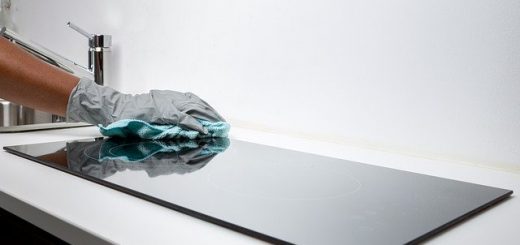How to Clean Your House If You Have Contact Dermatitis
Cleaning solutions, such as those containing bleach, solvents, and acids, can potentially irritate skin while performing household cleaning. Individuals diagnosed with contact dermatitis will especially suffer. Cleaning is necessary, so here’s how even people with contact dermatitis can do so.
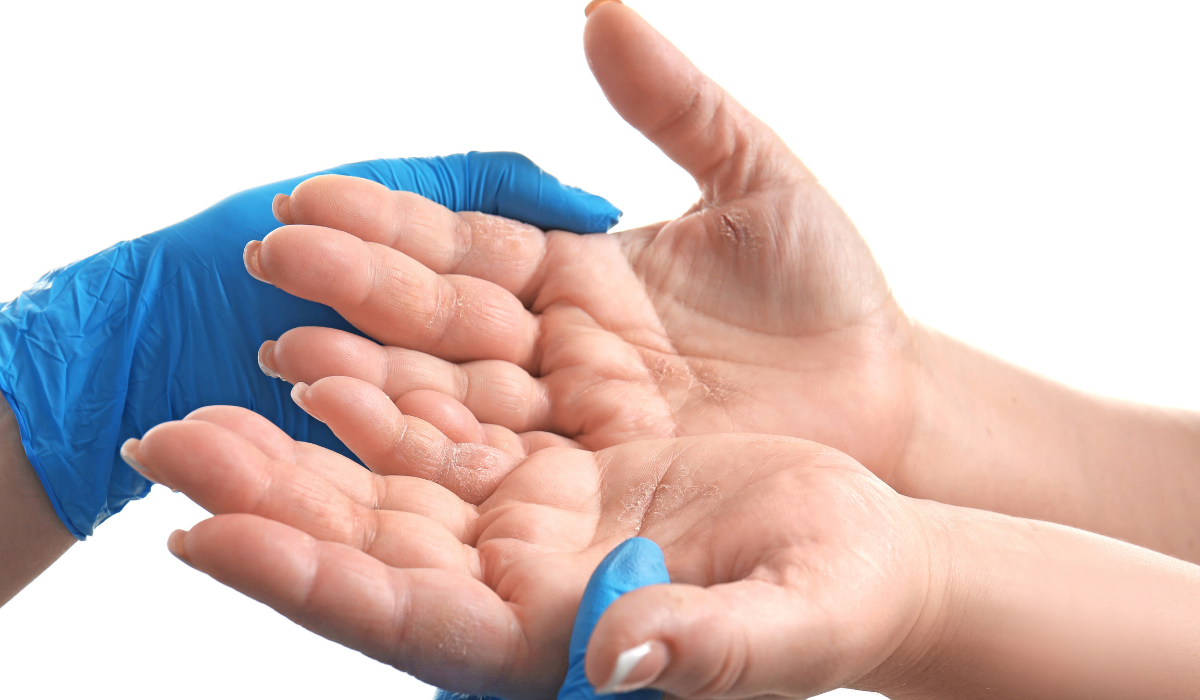
Many household cleaning products can be rough on the skin. While powerful cleaning solutions can certainly irritate the skin, even gentler ones can cause dryness and inflammation, especially in those who are sensitive to cleaners or who use them on a frequent basis.
People with sensitive skin may develop red, swollen, and itchy rashes when exposed to cleaning solutions. Dermatologists recognize these symptoms as contact dermatitis. Homeowners are urged to know what cleaning chemicals inflame or irritate their skin and take measures to avoid them.
What is contact dermatitis?
The redness and itchiness that accompany contact dermatitis are caused by allergens. When certain chemicals touch the skin, the body assumes it is under attack and sends antibodies to fight the allergens. The red and itchy skin usually forms wherever the cleaning solutionA solution is a homogeneous mixture of two or more substance... More touched it.
Contact dermatitis is categorized into two different types. Harsh cleaners and other chemicals can cause what is known in the medical community as irritantAn irritant is a substance that causes temporary discomfort ... More contact dermatitis. The other type of dermatitis is allergic contact dermatitis, where the body reacts to an allergic trigger.
While creams and medications can help reduce the redness and inflammation, avoiding the chemicals that caused these symptoms in the first place is a better option. Individuals suffering a bout of contact dermatitis will find the symptoms clear in about two to four weeks.
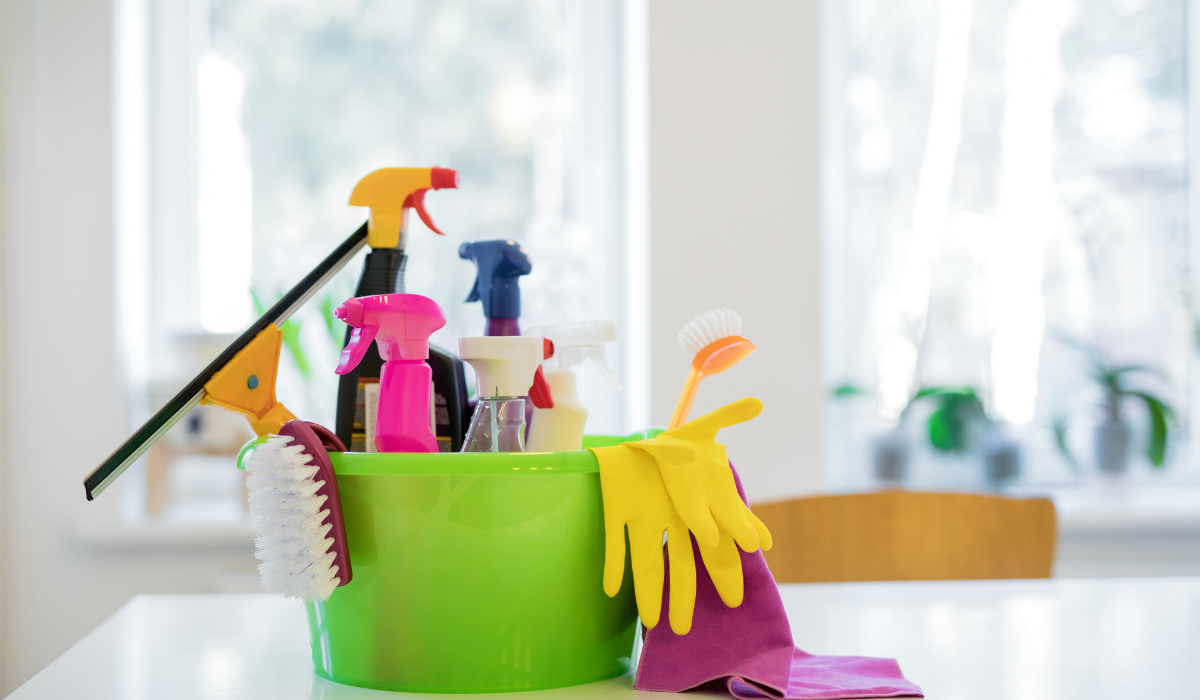
What common cleaners cause irritation?
People with sensitive skin are urged to avoid chemical cleaners that contain certain ingredients; another option is to protect the skin when using harsh solutions. Ammonia is a common irritantAn irritant is a substance that causes temporary discomfort ... More found in floor cleaners, window cleaners, disinfectants, and all-purpose cleaners.
Hydrochloric acid is found in drain cleaners. Oven cleaners contain lye, another skin irritantAn irritant is a substance that causes temporary discomfort ... More. Floor cleaners and waxes are manufactured with petroleum solvents, which can irritate sensitive skin. Sodium bisulfate is found in toilet bowl cleaners, and ammonium hydroxide is an ingredient in spot removers.
What are the cleaning tips to prevent irritation?
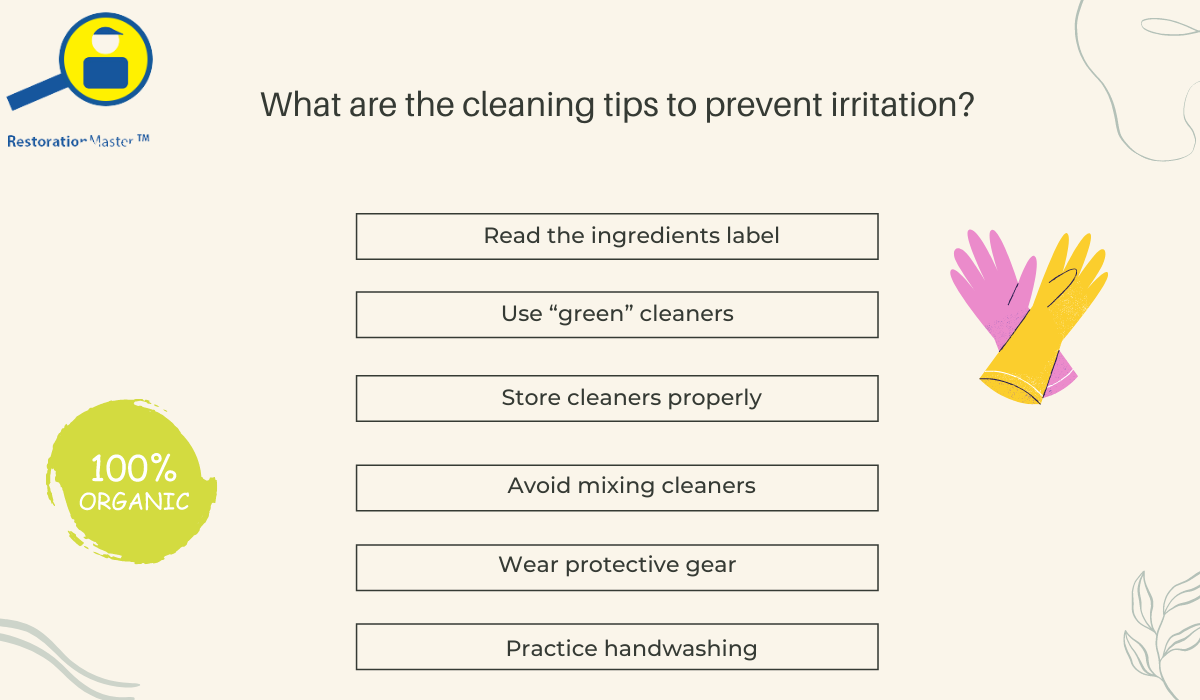
Read the ingredients label
Homeowners should read the ingredients listed on the label of a household cleaner in order to know what the product contains. An individual who has had a past reaction to a specific ingredient should avoid products that contain that chemical. Use the cleaner according to the instructions.
Use “green” cleaners
Cleaning solutions that are environmentally friendly will not prevent contact dermatitis; however, the all-natural products can be gentler on the skin. Green products may also be fragrance-free or dye-free, which are safer for the skin. Alternately, try cleaning with baking soda.
Or consider making homemade cleaners that are safe on the skin. Two parts water and two parts white vinegar create an effective all-purpose cleaner and disinfectantA disinfectant is a chemical substance used to kill or inact... More. Hard surfaces, like sinks and stainless steel, can be scoured with a paste consisting of three parts baking soda and one part water.
Store cleaners properly
A bottle of cleaning solutionA solution is a homogeneous mixture of two or more substance... More could accidentally topple and expose a homeowner’s skin to the chemicals. Prevent a case of contact dermatitis by keeping all chemical solutions stored safely with their lids closed tightly. Also store the solutions in their original, labeled bottles.
Avoid mixing cleaners
Mixing cleaners is harmful and therefore unadvised. Combining bleach and ammonia, for instance, will release the toxic fume chloramine. An explosion can result when bleach and hydrogen peroxide are combined. Protect the household from dangerous gases by never mixing cleaning chemicals.
Wear protective gear
Individuals with contact dermatitis should wear protective gear when cleaning to avoid exposing their skin to harsh chemical cleaners. Waterproof gloves and long-sleeved shirts are recommended when cleaning. People with latexLatex is a natural or synthetic rubber material commonly use... More sensitivity may elect to wear plastic or vinylVinyl is a durable synthetic plastic material commonly used ... More gloves.
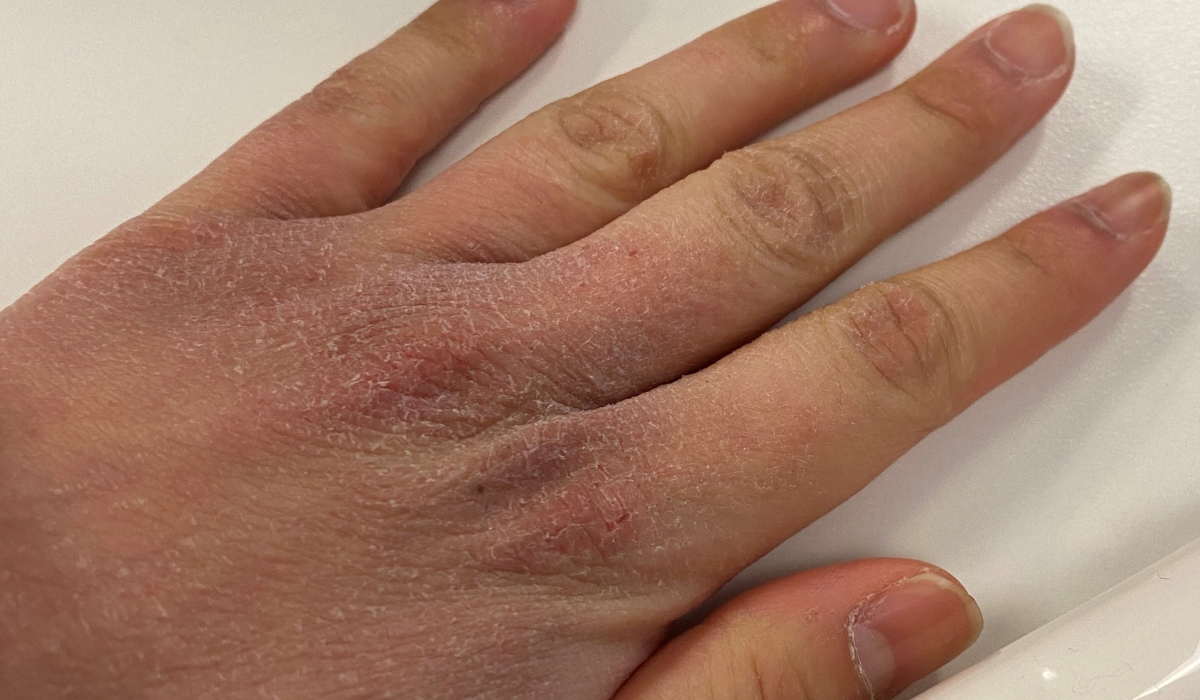
Practice handwashing
After a morning of cleaning the house, individuals with contact dermatitis should wash their hands with soap and warm water. Handwashing after cleaning protects the skin from splatters of the chemical solutionA solution is a homogeneous mixture of two or more substance... More, whether it’s laundry detergent or a window cleaner.
If you cannot handle the cleaning yourself, read When Does My House Need Professional Disinfection? to consider reaching out to cleaning technicians.
How is contact dermatitis treated?
While avoiding harmful ingredients in cleaning substances is advised, homeowners’ skin may still come into contact with harsh cleaners. When symptoms of contact dermatitis develop, call a dermatologist for treatment. Prescription ointments or creams can reduce redness and inflammation.
Steroid medications may be prescribed if the original treatment (creams or ointments) has failed to improve symptoms within one week. In any case, avoid scratching the red areas, even if they itch. Scratching can worsen the itchiness and leadLead is a heavy metal that can be toxic to humans, especiall... More to an infectionInfection is the invasion and multiplication of harmful micr... More. Instead, moisturize the skin.
Scrubbing the house clean can be accomplished, even by individuals suffering from contact dermatitis. All it takes to prevent a case of contact dermatitis is avoiding ingredients that are known to cause skin irritation or ensuring enough protective gear is worn during cleaning routines.
Cleaning the home can be a DIY task. But when cleaning is time-consuming or harsh on the skin despite efforts to protect it, call in the professional cleaners. They specialize in the cleaning of tile and grout, whether in the kitchen, bathrooms or entryways.
Tiles are susceptible to dirt and stains. The grout in between the tiles can also develop moldMold is a type of fungus that grows in damp or humid conditi... More and mildewMildew is a type of fungus that grows on damp surfaces, typi... More. Eventually, uncleaned tiles can become discolored and loosen. Since grout traps moisture, uncleaned areas containing grout can develop severe moldMold is a type of fungus that grows in damp or humid conditi... More infestations.
Professionals are skilled in thoroughly cleaning tile and grout in every location of the home or business. They evaluate all areas and perform a pre-cleaning using environmentally friendly cleaning products. A primary cleaning and post cleaning follow. Once dry, a final inspectionInspection is the careful examination and assessment of a pr... More is done.












